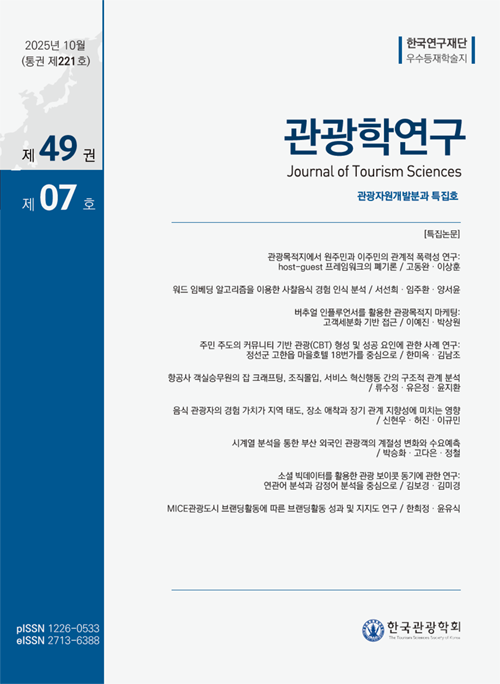- 영문명
- Relational violence between local residents and immigrants in tourism destinations
- 발행기관
- 한국관광학회
- 저자명
- 고동완(Dong-Wan Ko) 이상훈(Sang-Hoon Lee)
- 간행물 정보
- 『관광학연구』제49권 제7호, 9~29쪽, 전체 21쪽
- 주제분류
- 사회과학 > 관광학
- 파일형태
- 발행일자
- 2025.10.31

국문 초록
이 연구는 제주도를 대상으로 관광목적지에서 지역주민과 관광자의 관계적 폭력성을 규명하고, 기존 host-guest 프레임워크의 한계를 검토하였다. 제주도 토착민 4명과 이주민 6명을 대상으로 심층면접을 실시하고 주제분석법을 적용하여 분석하였다. 연구 결과, 첫째, 외부자본 중심의 관광개발로 지역 연계산업이 붕괴되고 경제적 이익이 편중되는 구조적 폭력이 확인되었다. 둘째, 출신 고등학교나 발음을 통한 배제 메커니즘이 이주민의 사회경제적 참여를 제약하는 상징적폭력이 나타났다. 셋째, 4·3사건의 집단기억과 ‘괸당’ 문화가 이주민 배제를 정당화하는 문화적 폭력의 근본 기제로작용하였다. 넷째, 기존 host-guest 프레임워크와 달리 ‘누가 주인인가?’에 대한 근본적 의문이 제기되며 이주민의 모호한소속감이 발견되었다. 다섯째, 이주민은 관광산업 혜택에서 배제되면서도 토착민으로부터 ‘외지인’으로 배척받는 이중적소외를 경험하였다. 이 연구는 40여 년간 지배적이었던 host-guest 패러다임의 실증적 폐기 근거를 제시하고, ‘관광-관계폭력지형(TRLV)’ 개념을 제안하여 관광목적지의 복잡한 권력관계를 분석할 수 있는 이론적 틀을 구축하였다.
영문 초록
This study examines relational violence between native and migrant residents in Jeju Island and critically reviews the limitations of the host-guest framework. In-depth interviews were conducted with 4 native Jeju residents and 6 migrant residents, analyzed through thematic analysis. The findings are as follows. First, external capital-led tourism development led to the collapse of ancillary local industries and the uneven distribution of economic benefits, revealing a form of structural violence. Second, exclusion mechanisms based on high school affiliations and pronunciation constrained migrants’ socioeconomic participation, manifesting as symbolic violence. Third, collective memory of the April 3rd Incident and ‘gwaendang’ culture functioned as the foundation of cultural violence that legitimized the exclusion of migrants. Fourth, contrary to clear group distinctions in the host-guest framework, fundamental questions arose about ‘who is the host?’, revealing the migrants' ambiguous sense of belonging. Fifth, migrants experienced a double bind of exclusion: being excluded from tourism benefits while also being ostracized by indigenous residents as ‘outsiders.’ This study provides empirical grounds for moving beyond the long-dominant host-guest paradigm and proposes the ‘Tourism-relational violence landscape (TRLV)’ concept as a theoretical framework for analyzing complex power relations in tourist destinations.
목차
Ⅰ. 서 론
Ⅱ. 이론적 배경
Ⅲ. 연구방법
Ⅳ. 결과 및 고찰
Ⅴ. 결 론
References
키워드
해당간행물 수록 논문
참고문헌
최근 이용한 논문
교보eBook 첫 방문을 환영 합니다!

신규가입 혜택 지급이 완료 되었습니다.
바로 사용 가능한 교보e캐시 1,000원 (유효기간 7일)
지금 바로 교보eBook의 다양한 콘텐츠를 이용해 보세요!



